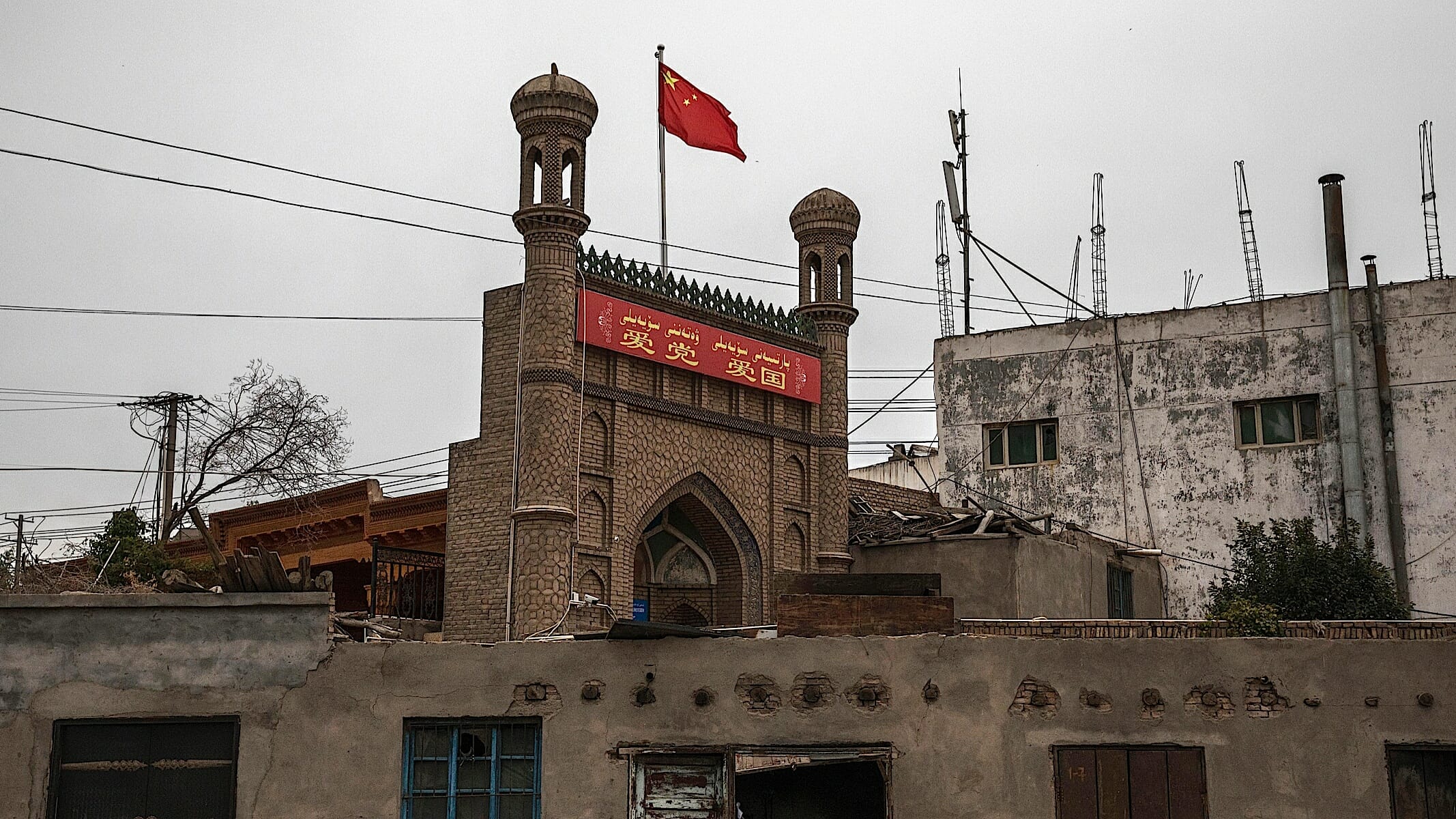China Has Detained Millions of Muslims in Concentration Camps. What Will The U.S. Do?
Photo by Kevin Frayer/Getty
China is carrying out the largest mass human internment of the twenty-first century. The Chinese government has reportedly imprisoned three million of its Muslim ethnic minority population in Xinjiang province, on the country’s western border. Reports say about ten percent of the region’s Uighur Muslim population has vanished behind the walls of concentration camps. Detainees have been subjected to totalitarian indoctrination and tortured for what the Chinese government characterizes as crimes against the Communist Party, including charges of terrorism, but which in reality can be as innocuous as growing a beard, translating into English, owning a compass, or quitting smoking. Many detainees have reportedly “disappeared,” and many have died. The United Nations and governments around the world—including the United States—have acknowledged the extensive human rights abuses, but the Trump administration hasn’t yet announced plans for substantive action.
The Chinese government calls the program a system of “re-education camps”—Chinese officials have described them as free vocational training and boarding schools to combat Muslim extremism. But intrepid reporting over the last year from global media outlets, aided by the cooperation of former detainees, has exposed the camps for what they are.
Lined with watchtowers and razor wire, the interiors carved up into spartan classrooms and constrictive cells, they appear from outside and inside alike to be nothing other than vast prisons. The government subjects the interned Muslims to a variety of mental and physical torture, including solitary confinement, a barrage of brainwashing, and beatings and mysterious forced injections. According to interviews with former detainees, the regimen has led many people to commit suicide.
The program isn’t new to us, or at least shouldn’t be. Major global press outlets, including American media such as the New York Times and the Washington Post, have published extensive reporting on the camps over the last year or so, including hidden camera footage from inside the walls. But somehow the story eludes the collective American consciousness. Perhaps—stick with me here—it’s because the targets are Muslims.
When asked about the scale of the abuses in a Face the Nation interview earlier this month, U.S. Secretary of State Mike Pompeo said there were “up to a million [Muslims] held in reeducation camps.” However, Randall Schriver, head of Asia policy at the U.S. Defense Department, recently told reporters during a press briefing, “The (Chinese) Communist Party is using the security forces for mass imprisonment of Chinese Muslims in concentration camps,” and pegged the number of detained Uighurs at “closer to three million citizens.” When Face the Nation host Margaret Brennan reminded Pompeo he was at odds with his own government in both terminology and assessment, Pompeo snorted, “Don’t—don’t play ticky-tack.”
After Pompeo met with a group of Uighur Americans this spring, one of the group said his family members were arrested and imprisoned four days later in an apparent act of retaliation from the Chinese government.
The conflict between the Uighurs and the Chinese government isn’t new. It dates back decades, and in the abstract much longer than that. Over the last ten years or so, however, Xinjiang has seen several violent uprisings as the oppressed Muslim minorities—the Uighurs, as well as Kazakhs and Tartars—have sought freedom and autonomy from the country’s Han ethnic majority and ruling class. (The Uighurs call Xinjiang “Oriental Turkistan,” and they bear their own flag, which the Chinese government has banned.)
Uighurs in Xinjiang (though again, they’re not the only Muslim minority targeted in the sweeping government campaign) live under what’s been described as a “fully-fledged police state,” including oppressive restrictions the government has imposed on their religious practices, as well as their cultural traditions and private lives. This includes ubiquitous public surveillance, such as the hundreds of thousands of cameras in Xinjiang—on streets, in front of every mosque, and even in taxis and at bathroom entrances—connected to the country’s national dystopian facial recognition network. The government’s digital sight also reaches into the homes of private citizens.
That totalitarian infrastructure is itself part of a larger, dystopian state security apparatus administered nationwide under Chinese President Xi Jinping. The Chinese have long championed political transformation through education (in reality all too often indoctrination), the extreme recent example being the reformations enacted during Mao Zedong’s rule. President Xi, who in 2017 China enshrined as leader-for-life—an anti-democratic development which President Donald Trump characterized as an “extraordinary elevation” in a congratulatory message—often cites Mao’s influence on his current regime.
James Millward, a China historian with Georgetown University, sees it in more severe terms: “Cultural cleansing is Beijing’s attempt to find a final solution to the Xinjiang problem.” But last year a Chinese envoy to the U.N. downplayed the program as free vocational training with language education. This apparently noble effort itself, however, seems at odds with what the same official described in the same speech as efforts to transform the ideology of Chinese citizens “who have been lured into terrorist activities.” That effort, he added, “is nothing to do with religion.” He went on to laud China’s efforts to promote human rights.
LIFE IN THE CAMPS
The Chinese government has kept a tight lid on the internment program, offering no publicly available data on how many camps there are or how many people it has detained. However, journalistic research into bids on government contracts, satellite photos, and recruitment ads has revealed that construction is ongoing. Here are some details on life in the camps, taken from personal accounts former detainees have provided reporters.
Five armed policemen arrested one detainee on his parents’ doorstep, claiming they had a warrant for his arrest in a far-away town where he’d lived years before. They wouldn’t let him call a lawyer, saying his case was “special.”
Police held him in a cell for a week without access to outside communication, after which they drove him the 500 miles to his former town. Police then strapped him into what’s called a “tiger chair,” that cinched his wrists and ankles. In a scene reminiscent of the U.S.’ own “enhanced interrogation techniques,” they reportedly then strapped him up by his wrists with his back to what he described as a barred wall, forcing him to stand on the balls of his bare feet or hang and endure intolerable pain. Police wanted to know about his connections to Muslim activists in China and abroad, and about his work with a tourist group that facilitated Chinese applications for Kazakh visas, which the police told him was a front to help Muslims (presumably thought to be terrorists) flee the country. The interrogation lasted several days, and at the end he gave them a few names.
The police then locked the detainee in a small cell with 17 other prisoners, all with their feet chained to the legs of two beds. They were transferred to a camp that held about 1,000 prisoners, where for weeks on end they were subjected to indoctrination the man described as brutal. From a report in the Independent:
Mr Bekali was kept in a locked room almost around the clock with eight other internees, who shared beds and a wretched toilet. Cameras were installed in toilets and even outhouses. Baths were rare, as was washing of hands and feet, which internees were allegedly told was equated with Islamic ablution.
Mr Bekali and other former internees said the worst parts of the indoctrination program were forced repetition and self-criticism. Although students did not understand much of what was taught and the material bordered on the nonsensical to them, they were made to internalise it by repetition in sessions lasting two hours or longer.
“We will oppose extremism, we will oppose separatism, we will oppose terrorism,” they chanted again and again. Almost every day, the students received guest lecturers from the local police, judiciary and other branches of government warning about the dangers of separatism and extremism.
In four-hour sessions, instructors lectured about the dangers of Islam and drilled internees with quizzes that they had to answer correctly or be sent to stand near a wall for hours on end.
“Do you obey Chinese law or Sharia?” instructors asked. “Do you understand why religion is dangerous?”
They lived in locked cells with several other detainees, sharing beds and a toilet. There were cameras trained on the toilets and outhouses. Some detainees were forced to eat pork and drink alcohol, both forbidden in Muslim culture. Detainees would wake at dawn, then sing the Chinese anthem and raise the flag. They’d be packed into classrooms where they practiced propaganda songs—“Without the Communist Party, there is no New China”—and were taught Mandarin, much of which was nonsense to many and only memorized through repetition. The people in charge forced them to criticize themselves and the other detainees, and forced to repeat en masse short propaganda phrases for hours at a time. They ate vegetable soup and buns, and before each meal were ordered to chant, “Thank the Party! Thank the Motherland! Thank President Xi!”
Detainees who eventually confessed to the alleged crimes charged against them were forced to repeat, “We have done illegal things, but we now know better.”
One former detainee who has since fled to Turkey described a harrowing, humiliating, dehumanizing experience. She was forced to repeat, “I am Chinese. I am proud of China,” thousands of times, while standing and under constant watch of armed policemen in the class. The walls of one classroom were painted with the message: “Follow the directives of President Xi Jinping on socialism with Chinese characteristics for a new era.” She described several instances of violence, such as police bursting into classrooms to remove people. “I never saw those people again,” she said. She described hearing calls for help during dinner: “Saddest voices I ever heard. We thought they were being tortured.”
Some prisoners, she said, were given injections—not medical injections but “like torture, used to control their minds.” Prisoners would stick their arms through an opening in their cell door to receive the shots. “Soon after the injections, we didn’t get our periods anymore,” she said.
The Chinese government has since issued propaganda videos to explain the camps. They show students in brightly lit language classes and workshops where they learn sewing and carpentry. They look comfortable.
Many people in the Muslim communities themselves still seem in the dark about what goes on in the camps—or they feign ignorance. They’ve described them to reporters as possibly schools, where their father or brothers are students learning languages. But such ignorance seems like a stretch. After all, people have been released. “We never left our twenty-square-meter room,” one woman said, when asked about the government videos. “It’s a lie.”
It would seem natural, of course, that Muslims wouldn’t want to admit what they know about the camps to journalists. Foreign Policy magazine reported that Muslims can be sent to concentration camps for 48 reasons, many of them absurd: Owning a tent; growing a beard; not smoking or drinking alcohol; wearing a scarf in the presence of the Chinese flag; “inviting multiple families to your house without registering with the police department”; traveling abroad; speaking to someone who has traveled abroad; or being related to someone who has done any of these things. One woman, a mother of three, was arrested because she had a photo on her phone of a girl praying. She was accused of terrorism.
The crackdown now transcends China’s borders to the Uighur diaspora abroad. The Chinese Embassy in France, for instance, has refused to give critical papers to Uighurs living there, which they need to establish identity. The goal, apparently, is to force them to return to China, where they will be arrested and imprisoned.
THE STORIES WE TELL OURSELVES
The only degree of credibility we can give the Chinese government’s claims of terrorism is that some Muslim groups (outside of Xinjiang) who side with the Uighur independence movement have also aligned themselves with terrorist groups. For instance, the Turkistan Islamic Party—which operates out of Afghanistan, Pakistan, and Syria—produces Islamist extremism recruitment propaganda. And China has indeed experienced jihadist terrorist attacks, though not many, and none of them severe. That said, these groups don’t have much sway in Xinjiang.
Clearly this is about religion. More specifically, it’s a systematic, government-run effort to erase not just a religion, but an entire people: their identity, language, and culture. In contrast to Pompeo, U.S. Ambassador Michael Kozak remarked, “You haven’t seen things like this since the 1930s.” The Chinese government, he added, “is trying to basically erase [Muslim minorities’] culture and their religion and so on from their DNA. It’s just remarkably awful.”
This, of course, should sound familiar: A powerful U.S. adversary systematically interning without pretense an ethnic minority that happens to be widely maligned at home. In the decade or so of Hitler’s rise—before Japan forced our hand—the U.S. government, concerned with a deep economic crisis at home, could successfully ignore the plight of the European Jews in part because Jews weren’t exactly highly respected in America. Though it’s still a little unclear how long this has gone on in China—it’s been at least a few years—thanks in part to Beijing’s successful suppression of the largely undocumented program and in part to our own longstanding tradition of feigning ignorance, Americans haven’t until now been aware of the extent of the program and its brutalities.
But now that the news has reached our screens, and in a world where news travels at the speed of light, the U.S. government will feel increasing pressure to address these targeted human rights abuses without risking war with a major military power.
This, of course, is what we get under Trump. Our president’s wretched policies and his putrid, poltroonish personal behavior have all but rotted our moral standing. He’s done his best—mostly by not doing anything—to disrupt the Western global alliance in favor of hewing more and more closely to autocratic, demagogical regimes such as in Saudi Arabia, Russia, and North Korea. In an official 2018 State Department statement on China’s human rights record, Secretary Pompeo said, China “is in a league of its own when it comes to human rights violations.” But when he elaborated, he dedicated one sentence to the Xinjiang crisis—which he called “re-education”— before pulling the predictable both-sides pivot: “The government also is increasing its persecution against Christians, Tibetans, and anyone who espouses different views from those or advocates those of government — or advocates change in government.”
Indeed, the Trump administration makes quite clear that it is loath to take any punitive steps that might perturb President Xi, a de facto dictator for whom Trump routinely exhibits a bizarre but familiar fondness and deference. True, Trump seems cataclysmically hawkish on China trade policy, but the acrimony stops at the economy. He hasn’t made a public statement about the concentration camps.
The U.S. Congress, however, has made good-faith efforts to censure China, including bipartisan calls to impose Global Magnitsky Act sanctions on Party leaders. And officials at the State Department prepared sanctions last year, but the effort got killed by the Treasury Department, which is in the middle of trade negotiations. The State Department went so far as to issue a statement—“We call on the Chinese government to release immediately these individuals’ family members and all others arbitrarily detained in the camps”—but Secretary Pompeo’s dismissive Face the Nation interview, held soon thereafter, gave the lie to the split loyalties that define so much of the Trump administration: Those who fight for democratic values and institutions, and those who fight for Trump.
So it shouldn’t shock us to hear the pessimism and despair in the voices of our allies. A European diplomat told the Washington Post, “There has been discussion that the E.U. would be much stronger if other Western countries—including the U.S.—would work as one front toward China.” The official pointed out that China sees the detention program as a way to further drive the U.S. from Europe and destabilize Western unity.
However, Muslim-majority countries have also been conspicuously silent on the issue. Only Turkey and Indonesia have spoken out forcefully. This might seem strange until you consider the incentive China offers in the form of its massive One Belt, One Road trade and infrastructure initiative, which will connect China with South and Southeastern Asian trading partners, including Pakistan and the Gulf States. To that end, Saudi Crown Prince Muhammad bin Salman—who rules a Muslim nation, and who Trump bowed to after the murder and dismemberment of U.S. resident and Post journalist Jamal Khashoggi—has said nothing, and has reportedly quashed all criticism because of trade concerns. And according to the readout of a call between the MBS’s father—the Saudi King—and President Xi, “Xi said that China attaches great importance to developing the comprehensive strategic partnership between the two countries and regards Saudi Arabia as an important cooperation partner in promoting the joint construction of the Belt and Road Initiative.”
We can say without much hyperbole, then, that as these trends continue, we face the real possibility of creating—and joining—a new axis of evil. Trump is on the road to accomplishing what many geopolitical theorists of the great powers school of thought have long dismissed: That one leader can change the world order. True, it takes government backing and a degree of popular support to enable such a leader, but it’s foolish to attribute the core blame here to anyone but Trump himself. Now we have an atrocity on our hands, a cultural genocide that history tells us could easily and quickly escalate to mass murder. But those are Muslims in China, and this is America. Prospects seem dim, at least from here, that the United States has the will to mount an effective and coordinated challenge to the Chinese government. China, now criminally bold, knows this as well as anyone. After all, what would such an effort take? What would it risk? What’s in it for us? And who, exactly, is “us”? This all raises an uncomfortable, haunting question: “Never again,” but never again for whom?







































